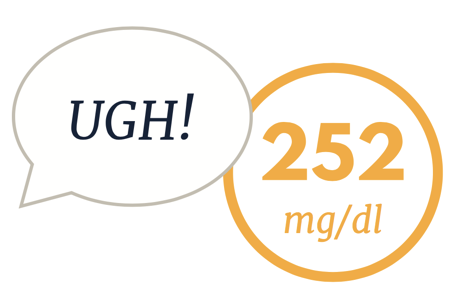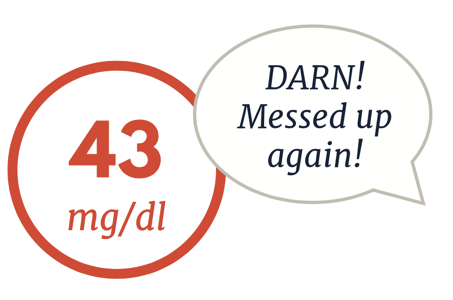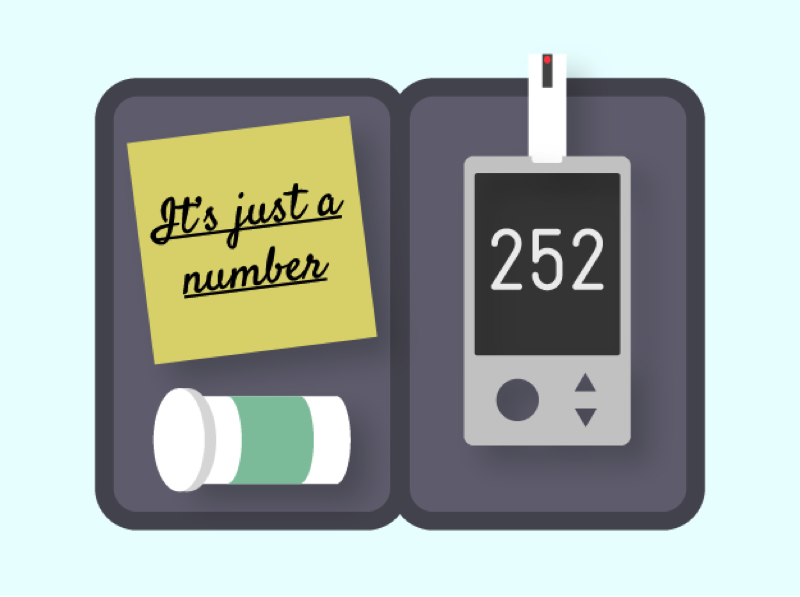Blood Sugars Are Not “Tests”
By Adam Brown
.jpg)
How a simple mindset trick transformed how I view blood sugars and use my diabetes data
Have you ever had a sense of dread when your glucose meter is doing the countdown (“5, 4, 3, 2, 1”) or when you’re about to check your CGM?
“Please, please tell me I got it right this time.”
“I hope I didn’t screw things up again.”
“Please don’t be a bad number.”
Baked into those statements is a sense that my glucose level is a grade on my diabetes performance – a “test.” This has important implications:
-
It drives a lot of self-blame, negativity, and guilt.
-
It can stimulate endless negative thought loops and frustrated questions.
-
It might even encourage less glucose monitoring – if getting a number is a negative experience, I may do it less often. (My teenage self can relate to that.)
The excerpt below is from the Mindset chapter of Bright Spots & Landmines (free PDF here or get it on Amazon for $6). It has helped me dramatically reframe my relationships with glucose data. Many readers have also emailed to share that this is one of their favorite takeaways in the book. Enjoy!
.png) BG numbers are neutral information to make a decision; they are not “good” or “bad” grades or “tests”
BG numbers are neutral information to make a decision; they are not “good” or “bad” grades or “tests”


When I see numbers like that, it’s easy to feel like I’m getting a “bad grade” or “failing” with my diabetes. Of course, this is the default interpretation when it’s called a BG “TEST.”
I neutralize these negative, blaming, self-critical feelings with a simple Mindset Bright Spot:
BG numbers are NOT good or bad. They are just information to make a decision. No judgment, no blame.
Or as my friend and diabetes advocate Jeff Hitchcock recently told me,
“The only ‘bad’ blood sugar is the one you don’t know.”
A speedometer in a car indicates if I’m going too fast or too slow, at which point I change how I’m driving (i.e., more gas or more brake). The number on my meter is a speedometer for my diabetes – change my medication, go for a walk, make a different food choice next time, etc. In other words, a 252 mg/dl or a 43 mg/dl is a neutral data point to drive an action. Once I start getting frustrated and attaching grades to BG numbers, it’s easy to feel like a failure, or worse, to skip the “TEST” altogether.
The Behavioral Diabetes Institute actually recommends putting a sticky note on your meter that says, “It’s just a number.” I love that!

When I was diagnosed, BG numbers did feel like a grade, which drove me to check less often, and in turn, spend less time in range.
I wish someone had likened diabetes to flying a plane from San Francisco to Sydney: would I trust a pilot using only three GPS readings over the course of a 15-hour flight? Or would I feel safer on a plane flown with GPS information updated every few minutes, plus trend arrows to guide safe flying?
More frequent data and trending information:
1. Confirms the plane is flying smoothly; or
2. Shows the plane is NOT flying smoothly and a course correction is needed.
No pilot in the world views GPS readings as a value judgment: “You are a bad pilot.” The plane’s current location is information to drive an action.
Diabetes is no different! Frequent BG data points are my friend and help me navigate the daily diabetes journey safely:
“I’m in-range now” or “I’m very likely to be in range soon” – do nothing.
“I’m out of range now” or “I’m likely to be out of range soon” – change something.
.png)
Transform how I view BG numbers: they are neutral data points to take action, not grades on my performance. This concept is so underappreciated in diabetes. Dr. Trang Ly, one of the smartest and most empathetic endocrinologists I know, has another good analogy to describe the unfairness of judging BG numbers:
“How would you feel if you were judged on your weight, if you were told it was a ‘good’ or a ‘bad’ number, and if you were made to weigh yourself multiple times per day? That’s the stigma and guilt people with diabetes have to deal with.”
Add “It is just a number” to my BG meter or CGM, or simply remind myself often.
Explain this concept to loved ones, who can help raise my spirits and take the big picture view when I’m sinking into self-blame mode.
--
Do you have questions for me? I’ve thought about dedicating future columns to answering anonymous reader questions. If you think this would be useful, please let me know and send questions by email here or on Twitter here.
Do you want more actionable diabetes advice like this? Get your copy of Bright Spots & Landmines: The Diabetes Guide I Wish Someone Had Handed Me. It’s available here as a free/name-your-own-price download. You can also purchase it on Amazon in paperback ($6.29) and Kindle ($1.99). The print book is priced at cost to ensure widespread access, and 100% of proceeds from digital downloads benefit The diaTribe Foundation, a 501(c)(3) non-profit.
Have you benefitted from Bright Spots & Landmines? Could you take a few minutes to write a one-sentence Amazon review sharing your experience? It would help us so much!







